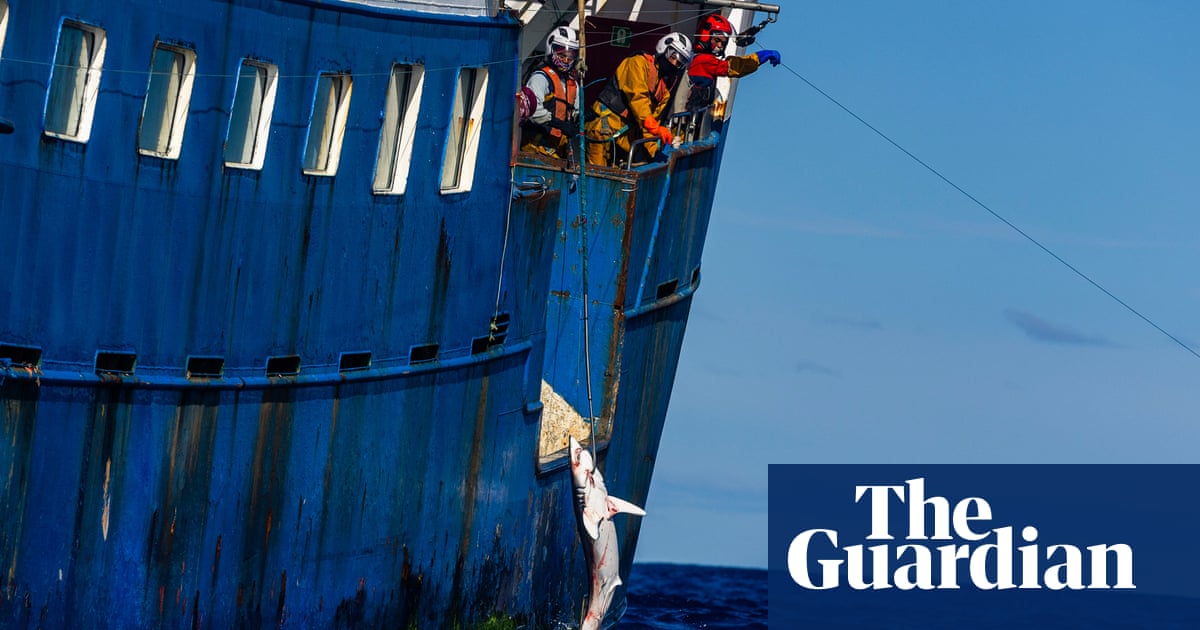Endangered sharks are being killed at alarming levels in the Pacific and industrial fishing is putting marine biodiversity at increasing risk,Greenpeacehas claimed, after its activists disrupted a Spanish vessel operating north of New Zealand.
The campaign group said activists on the Rainbow Warrior this week observed a longline fishing operation by the Playa Zahara in the South Fiji Basin.
Georgia Whitaker, a senior campaigner with Greenpeace Australia Pacific, was on board during the operation. She claimed the activists watched as the vessel hauled in and killed three endangered mako sharks in half an hour.
She said a small crew, including a trained shark handler, boarded a support boat to approach the Spanish vessel and released 14 animals caught on its line – among them eight near-threatened blue sharks, four swordfish and an endangered longfin mako shark.
The activists also removed more than 210 hooks and 20km of longline.
“It was devastating seeing these beautiful creatures being caught, often on their gills, in their mouth, by huge baited hooks,” Whitaker said. “They were fighting for their lives and then minutes later you’d see blood spilling over the side of the boat.”
Whitaker said the vessel’s crew told Greenpeace they were acting legally and primarily targeting swordfish.
Sign up for Guardian Australia’s breaking news email
According to the European Union’s reporting to the Western and Central Pacific Fisheries Commission (WCPFC), the Playa Zahara caught more than600,000kg of blue sharkin 2023 in thePacific Southwest.
Patricia Rodríguez, a spokesperson for Viverdreams Fish, the company that owns Playa Zahara, said in a statement the boat acted in accordance with international law and capturing species such as the mako shark and blue shark was not prohibited.
“The species mentioned by Greenpeace are within the quotas and limits allowed by the competent authorities, and the capture, handling and unloading procedures are controlled and documented, by all the systems established by the EU and Spanish authorities,” Rodríguez said.
The statement accused Greenpeace of “a campaign of disinformation”, violating maritime laws, stealing the fishing gear and posing risks to crews on both vessels by its intervention.
“Our company is strongly committed to the sustainability of marine resources and regularly collaborates with scientists, independent observers and fisheries authorities to ensure compliance with conservation standards,” she said.
AGreenpeace analysishas estimated that almost half a million blue sharks were caught as bycatch in the Pacific Ocean last year – the highest number recorded since 1991.
The same report found nearly 70% of EU longline catches in the region in 2023 were blue sharks.
World leaders will meet in Nice next week for the UN ocean conference to discuss thehigh seas biodiversity treaty, which Australia signed in 2023 but is yet to ratify.
Greenpeace has urged the government to ratify the treaty within the first 100 days of its second term. The treaty requires 60 countries to ratify it before it comes into force, but as yetonly 32 have done so.
Shark fishing is a lucrative global trade, worth an estimated$1bn annually. Global demand for shark meathas doubled in the past two decades.
Dr Leonardo Guida, a shark scientist with the Australian Marine Conservation Society, said the level of exploitation was alarming, given more thanone-third of shark and ray species are threatened with extinction globally.
“Sharks are important in the ecosystem, they typically occupy the top of marine food webs,” he said. “Steep population declines will cause food webs to potentially become unstable and ultimately collapse, there is a clear impact their loss could have on food security for a lot of nations.”
Guida said the creation of no-take marine sanctuaries was essential – to preserve marine life and to understand how ecosystems respond to the combined pressures of overfishing and the climate crisis.
“These sanctuaries act as controls,” he said. “They help us compare areas impacted by fishing with those that are not, which is critical to building resilience in ocean wildlife and managing our fisheries in a rapidly changing world, such that we reduce our impact on different species.”
